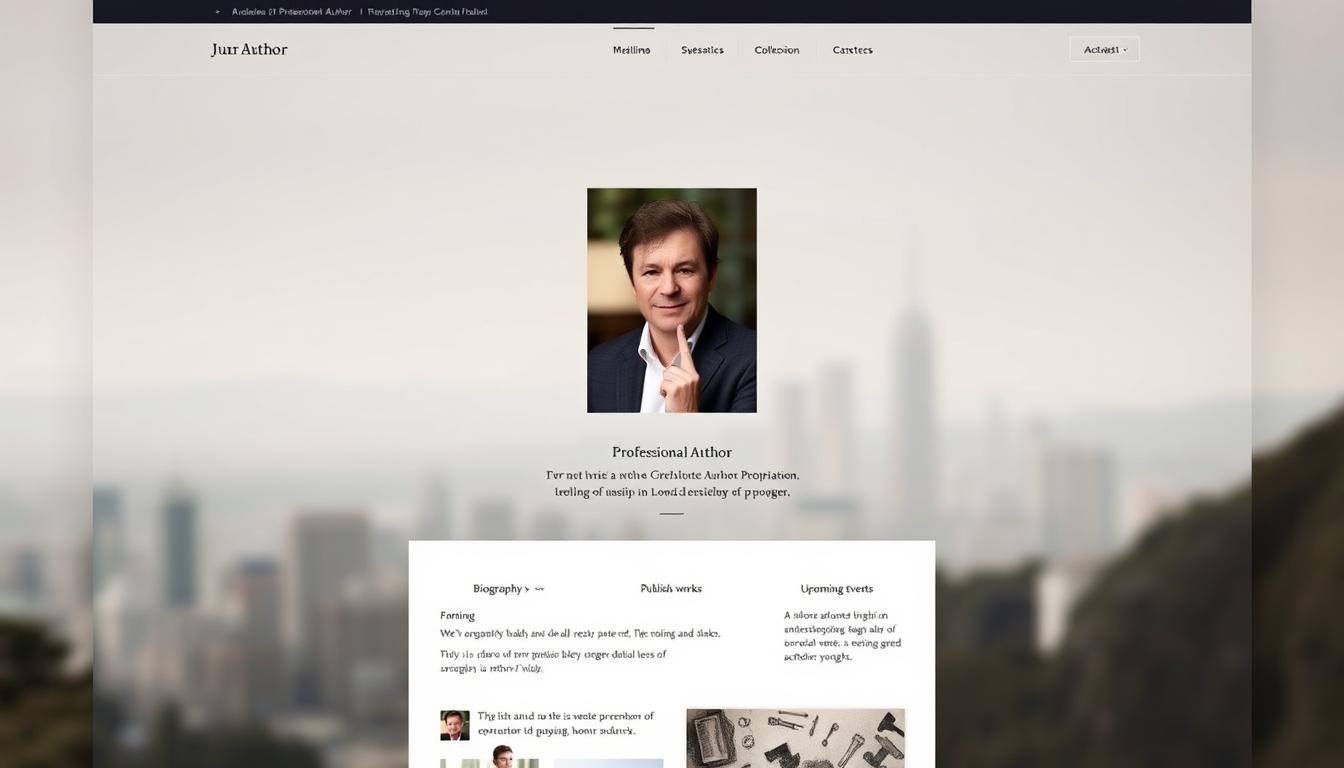Physical Address
304 North Cardinal St.
Dorchester Center, MA 02124
Physical Address
304 North Cardinal St.
Dorchester Center, MA 02124

Every creative professional needs a digital home that reflects their unique voice. For literary artists, a well-crafted online space serves as both portfolio and business card. It builds credibility with readers and helps publishers take your work seriously.
Modern platforms offer surprisingly sophisticated tools for building author websites. Many no-cost design solutions now match premium options in visual appeal and technical capabilities. These resources let writers focus their budgets on content creation while maintaining professional standards.
This guide explores curated design frameworks that balance style and practicality. You’ll discover options with clean layouts perfect for text-focused presentations. We’ll highlight adaptable templates that grow with your career, from debut projects to multi-book showcases.
A writer’s website acts as the cornerstone of their literary identity. In an era where 78% of readers research creators before purchasing books, your digital presence directly impacts career opportunities. This hub becomes your permanent address in the ever-changing landscape of publishing.
Publishers and agents frequently scout talent through digital portfolios. A polished site demonstrates professionalism, letting your work shine without distractions. It’s where you control the narrative about your creative process and published works.
Modern platforms offer intuitive tools for organizing book catalogs and blog posts. Built-in SEO features help potential readers discover your content through search engines. Social media integration keeps audiences engaged across multiple channels.
Many emerging writers face tight budgets while establishing their careers. High-quality templates now provide:
These cost-effective options eliminate upfront expenses while maintaining visual appeal. Writers can redirect funds toward editing services or targeted advertising campaigns. The result? A professional platform that grows alongside your career.
Launching your digital footprint shouldn’t drain your savings or demand technical expertise. Modern website builders empower literary creators with tools that balance affordability and polish. Let’s explore how these solutions remove traditional barriers to establishing an online presence.
Zero upfront costs mean more funds for editing services or marketing campaigns. Unlike premium alternatives requiring annual fees, no-cost designs deliver professional layouts ready for immediate use. Many authors launch polished sites in under a day using pre-built templates.
Quick setup processes eliminate weeks of waiting for developers. Intuitive dashboards let you upload content while learning basic platform features. This efficiency proves crucial when preparing for book launches or time-sensitive promotions.
Today’s templates offer surprising adaptability for personal branding. Adjust typography to match your book covers or rearrange sections to highlight your latest releases. Over 85% of current designs include:
Contrary to outdated assumptions, these frameworks support sophisticated features like parallax scrolling and dynamic menus. Experiment with different visual styles risk-free as your author brand evolves. The result? A professional site that grows with your career without recurring expenses.
Your website’s foundation determines how audiences experience your literary world. The right framework balances visual appeal with practical tools that showcase your work effectively. Let’s explore the critical elements that transform basic layouts into powerful storytelling platforms.
Mobile responsiveness isn’t optional – 58% of web traffic comes from handheld devices. Themes must adapt flawlessly to smartphones, keeping navigation smooth and text legible. Slow-loading pages drive readers away, so prioritize lightweight designs that load in under 3 seconds.
Search-friendly coding helps your content rank higher. Clean HTML structures and proper heading hierarchies make your books and blog posts easier for Google to index. Pair this with crisp typography using fonts that mimic printed books for comfortable reading sessions.
Customization freedom lets you craft unique layouts without coding. Look for drag-and-drop headers and color pickers that match your book covers. For authors selling directly, WooCommerce integration turns your site into a storefront – perfect for limited editions or signed copies.
Page builder compatibility future-proofs your site. As your career grows, these tools help create complex pages for events or multi-book series. Remember, your theme should grow with you – not limit your creativity.
Choosing the right theme shapes how readers connect with your stories. Three standout options offer distinct approaches to showcasing literary work while balancing style and practicality. Let’s explore what makes each solution unique for different author needs.

Author Portfolio excels with built-in book promotion tools. Its pre-designed homepage sections spotlight new releases while maintaining a clutter-free reading experience. Writers appreciate the drag-and-drop author biography module and seamless blog integration – perfect for mixing long-form content with book updates.
Neve stands out through limitless layout possibilities. Multiple header designs and widget-ready areas adapt to collaborative projects or serialized storytelling. The theme’s lightweight structure ensures fast loading, crucial for retaining mobile readers scrolling through chapter excerpts.
OceanWP bridges content and commerce with polished product displays. Its WooCommerce integration transforms book pages into storefronts without clunky plugins. The theme’s sticky navigation menus keep purchase options visible during lengthy blog posts or sample chapter readings.
Author Portfolio uses minimalist typography that mirrors paperback novels, creating instant familiarity for readers. Neve offers modular design blocks that rearrange like puzzle pieces – ideal for experimental authors. OceanWP leans into modern elegance with parallax effects that add depth to author photography.
Setup complexity varies significantly. Author Portfolio works straight out of the box with its writer-focused templates, while Neve demands more customization time for optimal results. OceanWP strikes a middle ground, offering guided setup wizards for sales-focused authors.
These themes serve different career stages. Debut authors benefit from Author Portfolio’s simplicity, established writers leverage Neve’s expandability, and hybrid author-entrepreneurs maximize OceanWP’s sales tools. Each solution proves that strategic design elevates written work without overwhelming visitors.
A website’s technical backbone determines its success in engaging modern readers. Smart design choices and flexible tools transform basic layouts into powerful storytelling platforms. Let’s explore the core elements that make themes both functional and future-ready.
Contemporary themes automatically reshape content for every screen size. Images resize dynamically, menus collapse into hamburger icons, and text columns adjust for comfortable mobile reading. This adaptability matters because 61% of users will leave sites that display poorly on their devices.
Speed optimization starts with lean code structures. Efficient themes minimize server requests and compress visual assets without quality loss. Some templates load pages 40% faster than competitors through smart caching techniques and optimized JavaScript.
Compatibility with essential tools expands your site’s capabilities. Popular page builders like Elementor integrate smoothly, letting you craft unique layouts through drag-and-drop interfaces. SEO plugins work hand-in-hand with themes to analyze content readability and keyword density.
Built-in search features give your work an indexing advantage. Clean URL structures and proper heading hierarchies help Google understand your book summaries and blog posts. Many templates now include schema markup for author profiles, creating rich search results that showcase your credentials.
Customization panels balance simplicity with depth. Beginners can change fonts and colors in minutes, while advanced users access CSS editors for precise adjustments. The best themes grow with your skills, offering:
Building an online presence often raises valid questions about platform reliability. Many creators worry their site might lack polish or face technical hurdles. Let’s address these concerns with practical strategies that maintain professionalism on a budget.
Limited design flexibility worries many authors. Page builders like Elementor solve this by adding drag-and-drop functionality to any theme. For advanced tweaks, custom CSS lets you modify fonts or spacing without breaking core files.
Choose themes from developers with active update histories. Reputable creators provide documentation and community forums. These resources help troubleshoot layout issues or plugin conflicts quickly.
Always download themes from the official directory or trusted marketplaces. Avoid third-party sites offering “premium-like” designs, which sometimes hide malicious code. Regular updates patch vulnerabilities – check your theme’s last revision date before installing.
Speed matters for reader retention. Lightweight themes load 50% faster than feature-heavy alternatives. Pair them with caching plugins and compressed images to shave seconds off loading times. Weekly backups protect your content if issues arise.
When free options fall short, consider hybrid approaches. Add premium plugins for specific features like advanced galleries or membership systems. This balances cost savings with functionality until you’re ready for full upgrades.
Your digital platform’s visual identity becomes an extension of your literary voice. Strategic theme selection bridges creative expression with technical functionality, ensuring your work resonates with readers. Focus on solutions that amplify your unique style while meeting practical performance benchmarks.
Start by defining your brand’s core elements. Choose color palettes that evoke your genre’s mood – deep blues for thrillers, soft pastels for poetry collections. Typography matters: serif fonts suggest tradition, while clean sans-serifs feel contemporary.
Genre-specific considerations shape reader expectations. Historical fiction authors might prefer parchment-like backgrounds, while sci-fi writers often opt for minimalist layouts. Test how different templates handle text density – some designs shine with brief excerpts, others showcase long-form content.
Always explore live demos with your actual content. Upload sample book covers and chapter excerpts to assess:
Scrutinize user reviews for recurring technical issues. Look beyond star ratings – detailed feedback reveals how themes perform during book launches or traffic spikes. Prioritize templates with recent updates and clear documentation.
Create a testing checklist covering essential needs:
Effective author platforms thrive on intuitive design paired with smart technical choices. Once your foundation is set, refining your site’s performance becomes key to maintaining reader engagement and visibility.
Modern drag-and-drop builders simplify layout customization for writers without coding skills. Tools like Elementor let you craft unique landing pages for book launches or event promotions. Their visual interfaces make real-time adjustments effortless.
Prioritize plugins that enhance functionality without slowing your site. Caching tools improve loading speeds, while SEO assistants optimize metadata for search engines. Social sharing integrations keep your content circulating across platforms.
Regularly audit your author website using analytics to identify improvement areas. Update plugins monthly to ensure security and compatibility. With strategic updates, your digital hub remains a polished gateway to your literary world.